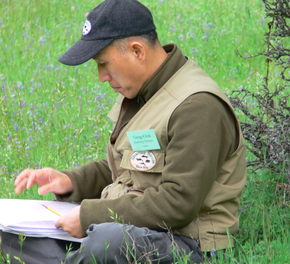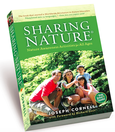Folding Poem
Concepts, skills, and qualities taught: Fellowship, reflection
When and where to play: Day and night / anywhere
Number of people needed: For 3 or more people
Suggested age range: Ages 10 and up
Materials needed: Pencils, paper
When and where to play: Day and night / anywhere
Number of people needed: For 3 or more people
Suggested age range: Ages 10 and up
Materials needed: Pencils, paper

Folding Poem beautifully captures the inspiration from shared nature experiences. This activity was created by the North Carolina Outward Bound School.*
To Play: Divide your group into teams of three or four, and give each team a pencil and paper. Each team will create a poem expressing their experience during, for example, a week in the wilderness or a Tree Imagery visualization, or on seeing a special animal. Below are the directions for creating a Folding Poem:
1.) Person A writes the first line of the poem and passes the paper to B.
2.) Person B responds to A’s line by writing two lines for the poem, then folds the paper so that C sees only the second line written by B.
3.) Person C responds to the line written by B by writing two additional lines. C folds the paper so that A sees only the second line written by C.
4.) Person A writes the last line of the poem based on the second line of poetry written by C.
As the poem is being written, each player has only a partial knowledge of the poem. But the beauty of this activity is that—because of the shared group experience—the poems created have a wonderful continuity and life to them.
When all the teams are finished (about 10 minutes), have each team read their poem.
Lines of Poetry written by team players A, B & C
A. __________________________________
B. __________________________________
----------------fold---------------------
B. __________________________________
C. __________________________________
----------------fold---------------------
B. ___________________________________
C. ___________________________________
You can write a Folding Poem with any number of players by passing the poem around to everyone so that each one can see only the last line written. Then you can have the person who started the poem also end it, as above.
* Larry Crenshaw and the North Carolina Outward Bound School, EarthBook (Birmingham, AL: Menasha Ridge Press, 1995).
Next activity
To Play: Divide your group into teams of three or four, and give each team a pencil and paper. Each team will create a poem expressing their experience during, for example, a week in the wilderness or a Tree Imagery visualization, or on seeing a special animal. Below are the directions for creating a Folding Poem:
1.) Person A writes the first line of the poem and passes the paper to B.
2.) Person B responds to A’s line by writing two lines for the poem, then folds the paper so that C sees only the second line written by B.
3.) Person C responds to the line written by B by writing two additional lines. C folds the paper so that A sees only the second line written by C.
4.) Person A writes the last line of the poem based on the second line of poetry written by C.
As the poem is being written, each player has only a partial knowledge of the poem. But the beauty of this activity is that—because of the shared group experience—the poems created have a wonderful continuity and life to them.
When all the teams are finished (about 10 minutes), have each team read their poem.
Lines of Poetry written by team players A, B & C
A. __________________________________
B. __________________________________
----------------fold---------------------
B. __________________________________
C. __________________________________
----------------fold---------------------
B. ___________________________________
C. ___________________________________
You can write a Folding Poem with any number of players by passing the poem around to everyone so that each one can see only the last line written. Then you can have the person who started the poem also end it, as above.
* Larry Crenshaw and the North Carolina Outward Bound School, EarthBook (Birmingham, AL: Menasha Ridge Press, 1995).
Next activity
